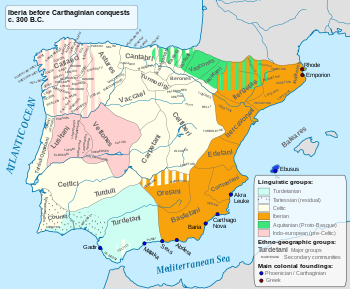Bergistani
 From Wikipedia the free encyclopedia
From Wikipedia the free encyclopedia

The Bergistani (Latin: Bargusii, Ancient Greek: Βαργουσίοι, romanized: Bargousíoi), were an ancient Iberian or Pre-Roman people of the Iberian Peninsula. They were related to the Ilergetes and were not numerous. They inhabited the valley of the Saiarra river in the upper course of the Llobregat in the northern Tarraconense.
History
[edit]The Bergistani were defeated by Hannibal during his overland journey to Italy at the beginning of the Second Punic War. They are also known for having rebelled against Rome in 197 BC. The rebellion was put down by consul Cato the Elder.[1] When they rose in revolt for the second time they were reduced to slavery. Livy mentions that the Bergistani had seven castles or fortifications. Their main castle, Castrum Bergium, could correspond to present-day Berga.
See also
[edit]References
[edit]- ^ Martínez Gázquez, José (1992), La campaña de Catón en Hispania (in Spanish) (First ed.), Publicacions i Edicions UB, ISBN 9788478759804
Bibliography
[edit]- Ángel Montenegro et alii, Historia de España 2 - colonizaciones y formación de los pueblos prerromanos (1200-218 a.C), Editorial Gredos, Madrid (1989) ISBN 84-249-1386-8
External links
[edit]